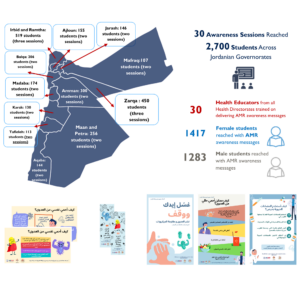Empowering Youth to Combat Antimicrobial Resistance
According to the World Health Organization (WHO), antimicrobial resistance (AMR) kills about 700,000 people worldwide annually, with the majority of those deaths occurring in developing countries. To address this health crisis, Jordan’s Ministry of Health (MOH) is implementing a National Action Plan (NAP) to combat AMR. In Jordan, young people between the ages of 12 and 30 years account for a significant portion, constituting around 36 percent of the population. Given their sizable presence, it becomes imperative to focus on AMR education specifically tailored for adolescents. Misconceptions about antimicrobials and AMR do exist among adolescents and could be addressed with proper health education actions. This is crucial to ensure that future adults are well-informed and make responsible choices, avoid unnecessary use of antibiotics, which would ultimately contribute to reducing the impact of AMR on the community.
Collaborative Initiatives: Educating Through Communication and Awareness
Aligned with Objective 4—enhancing pharmaceutical services, product availability, and patient-centered care— The US Agency for International Development (USAID) Medicines, Technologies, and Pharmaceutical Services (MTaPS) Program collaborated with the MOH School Health Directorate (SHD) and the Ministry of Education (MOE) to develop a Communication and Awareness for School Students (CASS) program. This program was designed to disseminate messages related to antimicrobial resistance (AMR) among young students and help shape their perceptions towards the use of antimicrobials before they develop potentially harmful attitudes and behaviors. MTaPS developed awareness messages with stakeholders based on the latest evidence, with a focus on priority messages. MTaPS, in coordination with SHD, implemented the CASS activities during 2023 in all health directorates across the country, reaching over 2,000 students.
Ensuring Sustainable Impact
Ensuring the sustained momentum of CASS initiatives, the seamless integration of CASS activities into the National Action Plan on Antimicrobial Resistance (NAP-AMR) 2023-2025 by the School Health Directorate (SHD) stands as a testament to sustainable endeavors. Bolstered by this success, the SHD aims to propel the impact further by extending CASS activities to more schools, marking a stride toward lasting community-wide change. By tailoring Communication and Awareness Intervention materials to align seamlessly with the SHD’s implementation plan. This collaborative commitment ensures the enduring legacy of CASS, paving the way for a generation equipped to combat antimicrobial resistance and foster a healthier tomorrow.

Information, Education and Communication materials distributed to students during the awareness sessions. Screenshot credit: MTaPS Jordan